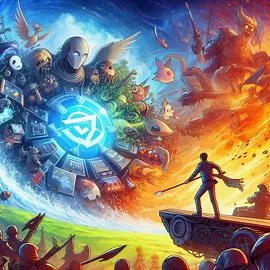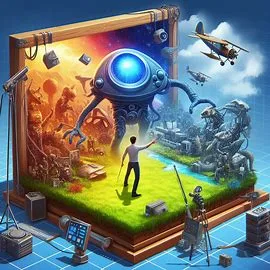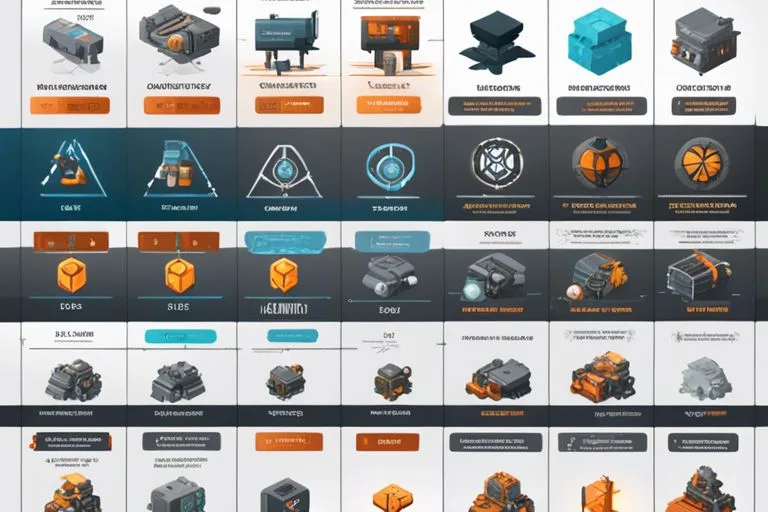Why Should Developers Explore the Ultimate Game Engine Comparison?
Comparison is a crucial step for developers looking to create top-tier games. Understanding the strengths and weaknesses of different game engines can make or break a project’s success.
By delving into the ultimate game engine comparison, developers can gain invaluable insights that can optimize workflow efficiency, enhance graphics and performance, and ultimately lead to a more polished final product.

Understanding Game Engines
To comprehend the significance of a game engine, developers must examine into its core definition and purpose. A game engine is a software framework designed to help developers build video games efficiently. It acts as the underlying architecture that provides various tools, libraries, and functionalities to streamline the game development process.
The primary purpose of a game engine is to abstract the complexities of game development, allowing developers to focus on game design, mechanics, and content creation rather than reinventing the wheel with each new project.
Components of a Game Engine
To gain a holistic understanding of game engines, one must familiarize themselves with the vital components that make up these powerful tools. A game engine typically consists of a rendering engine, physics engine, audio engine, scripting engine, and asset pipeline.
The rendering engine handles the visual aspects of the game, rendering graphics and displaying them on screen. The physics engine governs the laws of physics within the game world, dictating how objects interact and behave. The audio engine manages sound effects, music, and other auditory elements, enhancing the overall gaming experience.
The scripting engine allows developers to create gameplay logic and events using scripting languages. Lastly, the asset pipeline facilitates the management and integration of various assets such as 3D models, textures, animations, and sounds into the game.
Plus, understanding the role and interplay of these components is crucial in optimizing game development workflows and achieving desired gameplay outcomes.
Each component plays a crucial role in shaping the overall gaming experience and performance. Developers need to harness the capabilities of each engine component effectively to create immersive, interactive, and high-quality games.
Factors to Consider When Comparing Game Engines
Clearly, when developers are looking to compare game engines, there are several key factors they must take into consideration. From performance and capabilities to learning curves and community support, each aspect plays a crucial role in determining which engine is the best fit for a particular project.

Performance and Capabilities
A necessary factor to consider when comparing game engines is their performance and capabilities. Performance metrics such as rendering speed, frame rate stability, and scalability are crucial for ensuring a smooth gaming experience.
Capabilities including support for advanced graphics, physics engines, AI systems, and networking capabilities can significantly impact the overall quality and complexity of the game.
Learning Curve and Community Support
The learning curve and community support are necessary considerations when evaluating game engines. Learning curve refers to the ease with which developers can master the engine and create games efficiently.
A strong community support system can provide valuable resources, tutorials, and forums for developers to seek help and collaborate with peers. After thorough research and analysis, you can make an informed decision on which game engine aligns best with your project goals.
Capabilities such as real-time collaboration tools, asset store integrations, and cross-platform compatibility can also influence the decision-making process. It is crucial to weigh all these factors carefully to choose the ultimate game engine for your next project.
Major Game Engines on the Market

Unreal Engine
Not all game engines are created equal, and Unreal Engine stands out as one of the most powerful and versatile options available to developers. One of the key selling points of Unreal Engine is its stunning graphics capabilities, making it a popular choice for creating visually impressive games.
Additionally, Unreal Engine offers a wealth of features and tools that empower developers to bring their creative visions to life. From advanced physics systems to robust animation tools, Unreal Engine provides everything developers need to craft high-quality gaming experiences.
Unity
Unity is another major player in the game engine market, offering a more accessible and user-friendly approach compared to Unreal Engine. Unity is known for its versatility, allowing developers to create games for a wide range of platforms including mobile, console, and PC.
One of the key advantages of Unity is its large and active community, providing developers with access to a wealth of resources, tutorials, and support. This makes it an ideal choice for indie developers and small studios looking to bring their game ideas to fruition.
To examine deeper into the world of Unity, developers can explore its vast asset store, which offers a wide range of plugins, assets, and tools to enhance their game development workflow.
Godot
On the other hand, Godot has been gaining traction in the game development community as a free and open-source alternative to commercial game engines. Godot offers a lightweight yet powerful solution for developers looking to create 2D and 3D games.
With a focus on simplicity and ease of use, Godot provides a straightforward interface and intuitive scripting language, making it an attractive option for developers of all skill levels.
CryEngine
For developers looking to push the boundaries of graphical fidelity, CryEngine is a top contender in the market. Known for its stunning visuals and advanced rendering capabilities, CryEngine is a popular choice for developers working on high-end, visually impressive projects.
Any game developer looking to create visually stunning and immersive experiences should consider CryEngine as a powerful tool in their arsenal.
| Unreal Engine | Powerful graphics capabilities, advanced features, robust tools |
| Unity | Versatile, accessible, strong community support |
| Godot | Free, open-source, user-friendly interface |
| CryEngine | Stunning visuals, advanced rendering capabilities |
| Key Takeaway | Choose a game engine that aligns with your project’s requirements and your skill level |
Indie vs. AAA Game Development
Despite the differences in budget, scope, and resources between indie and AAA game development, both share a common need for a reliable game engine to bring their visions to life. The choice of game engine can make a significant impact on the development process and ultimately the success of the game.
The Distinctive Needs of Indie Developers
The indie game development scene is known for its creativity, innovation, and limited resources. Indie developers often work on smaller teams or even alone, requiring a game engine that is affordable, easy to learn, and flexible.
These developers prioritize tools that allow them to quickly prototype ideas and iterate on their game design without getting bogged down by technical complexities.
Indie developers also value community support and access to tutorials and resources when choosing a game engine. The ability to seek help from others in the indie game development community can be invaluable, especially for developers who are just starting out or working on their first game.
How AAA Studios Choose Game Engines
To AAA studios, the choice of a game engine is a crucial decision that can have long-lasting implications for their projects. AAA studios prioritize game engines that offer high-end graphics, performance optimization, and scalability to meet the demands of large-scale productions.
With access to considerable budgets and resources, AAA studios often opt for game engines that provide extensive support, professional services, and enterprise-level features. These studios look for game engines that can handle complex gameplay mechanics, advanced AI systems, and cutting-edge visual effects to deliver immersive gaming experiences.
Cross-Platform Development and Engine Flexibility
Many developers often find themselves at a crossroads when choosing a game engine for their projects. One of the key factors they need to consider is how well the engine supports cross-platform development and its overall flexibility. This can make or break a game’s success in today’s competitive market.
The Importance of Cross-Platform Support
Support for multiple platforms such as PC, consoles, mobile devices, and VR headsets is vital for reaching a broader audience and maximizing potential revenue. Game engines that offer robust cross-platform development tools can streamline the process of porting games to different systems, saving developers valuable time and resources.
When a game engine provides flexibility in terms of platform compatibility, developers can ensure their games are accessible to a wider range of players. This adaptability is crucial in a landscape where gamers are increasingly diverse in their gaming preferences and device choices.
Adapting to Different Hardware Requirements
One key advantage of using a game engine with flexible compatibility is the ability to adapt to the varying hardware specifications of different platforms. Whether developing for high-end PCs or mobile devices with limited processing power, a versatile engine can optimize performance across the board.
To maximize a game’s potential reach, developers must prioritize engine flexibility to ensure seamless adaptation to different hardware requirements. This approach not only enhances the player experience but also future proofs the game for upcoming technology advancements.
Futureproofing and Engine Updates
Once again, in the ever-evolving landscape of game development, it is crucial for developers to consider future-proofing their projects by choosing a game engine that stays updated with the latest technological advancements.
Engine updates are crucial to ensure compatibility with new hardware, software, and industry standards, allowing developers to create cutting-edge games that can stand the test of time.
Keeping Up with Technological Advancements
Future-proofing your game development process involves selecting a game engine that regularly updates its features and tools to keep pace with technological advancements.
Stagnant engines can quickly become outdated and limit the capabilities of your game. By choosing an engine that prioritizes updates, developers can take advantage of new rendering techniques, optimization improvements, and innovative features that enhance gameplay and performance.
As technology continues to advance at a rapid pace, game engines must evolve to meet the demands of modern game development.
Dynamic lighting systems, realistic physics simulations, and virtual reality integrations are just a few examples of the key advancements shaping the future of game engines.
Game Engines are Evolving
Any game engine comparison should assess how engines are evolving to meet the changing needs of developers in the industry. The ability to scale projects efficiently, streamline development pipelines, and support multiple platforms are becoming standard requirements for modern game engines.
To wrap up
Summing up, developers should explore the ultimate game engine comparison to make informed decisions when choosing the best engine for their projects. By understanding the key features, strengths, and weaknesses of different engines, developers can select the one that aligns best with their specific requirements and goals.
This comprehensive comparison can save developers valuable time and resources by helping them make the right choice from the beginning.
Furthermore, delving into a thorough game engine comparison allows developers to stay updated on the latest advancements in the industry. By keeping abreast of new features and improvements in various engines, developers can leverage this knowledge to enhance their skills and create even more innovative and immersive gaming experiences.
Ultimately, exploring the ultimate game engine comparison is a crucial step towards ensuring the success of any game development project.

